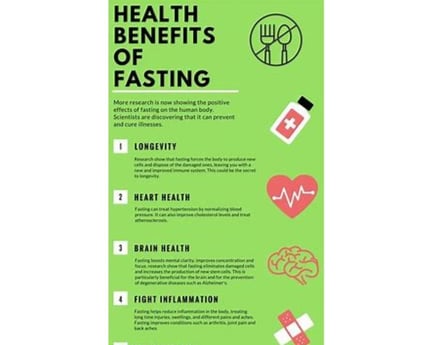
Quran and Fasting for Alzheimer's
Learn how incorporating Quran recitation and fasting can help prevent Alzheimer's disease. Discover the benefits for obesity, diabetes, smoking, alcoholism, hyperlipidemia, hypertension, constipati...
NERVOUS SYSTEM
Dr Hassan Al Warraqi
9/23/2023


Quran and Fasting for Alzheimer's
There is emerging research suggesting that the Quran and fasting may play a role in the prevention of Alzheimer's disease. While the exact mechanisms are not yet fully understood,
studies have shown that engaging in regular recitation and reflection of the Quran has positive effects on cognitive function. The act of reading and memorizing verses from the Quran exercises the brain, improving memory and concentration skills.
Additionally, fasting has been found to stimulate the production of certain proteins that protect brain cells from damage and promote their regeneration. Furthermore, the reduction in oxidative stress during fasting may also have a beneficial impact on brain health.
Although more research is needed to fully comprehend the extent of these effects, incorporating the recitation of the Quran and fasting into one's lifestyle may be potential strategies for Alzheimer's prevention. although Alsheimer usually seen in old ages some young people suffer this
either reading and memorizing or both reflect positively exercises the brain itself , improving memory sharpness and concentration ability .
awareness of the disease is important Quran and fasting for every one but we need to work on each one separately regarding obesity diabetes smoking alcoholism hyperlipidemia and hypertension constipation retention of urine i men and more specific problems if you have to control it
don't forget exercise and training addressing and solution is second to Quran recitation is open as you tolerate and from one verse onward and fasting from intermittent fasting 16-18 hours water only or non sugary drink to full Islamic fasting from fajer time to maghrib for one day or more up to 4 days a week or more
as per case by case tailored for him or she tolerate and should reveled at monthly or bimonthly basis this is the plan for people terrified to get Alzheimer where the treatment is more difficult coastally and difficult to apply
actually we face this problem late presentation of disease dementia patients plus the problems especially lack of finance and Attention and social life
what prophet said about benefit of quran
So I said What is the way out from it O Messenger of Allah He said Allah's book In it is news for what happened before you and information about what comes after you
and judgment for what happens between you It is the Criterion without jest Whoever among the oppressive abandons it Allah crushes him, and whoever seeks guidance from other than it then Allah leaves him to stray It is the firm rope of Allah
it is the wise remembrance it is the straight path and it is the one that the desires can not distort nor can the tongues twist it nor can the scholars ever have enough of it and it shall not become dull from reciting it much and the amazement of it does not diminish
It is the one that when the Jinns hear it they did not hesitate to say about it Verily,
we have heard a wonderful Recitation It guides to the Right Path and we have believed therein Whoever speaks according to it
then he has said the truth and whoever acts according to it he is rewarded and whoever judges by it he has judged justly and whoever invites to it then he guides to the straight path
finally the Quran and fasting two pillar for those at risk of developing Alzheimer
key words
Quran , fasting , Alzheimer's , fasting Islamic intermittent , obesity , diabetes , smoking ,alcoholism , hyperlipidemia , hypertension , constipation , retention of urine ,
The Impact of Quran Memorization on Mental Health and Its Relation to Alzheimer’s Disease
This document provides a comprehensive analysis of the impact of Quran memorization on mental health, the role of supplication (dua) in healing, and approaches to managing Alzheimer’s disease from medical and Islamic perspectives.
It also explores the concept of illness in Prophetic traditions and the healing verses in the Quran, drawing on credible sources.
Part 1: The Impact of Quran Memorization on Mental Health
Studies suggest that memorizing the Quran positively influences mental health by promoting emotional stability and reducing stress and anxiety.
The Quranic verses carry a spiritual energy that fosters calmness and enhances focus. Key insights include:
Role in Psychological Healing: Reciting and memorizing Quranic verses instills a sense of peace and security.
Social Support: A supportive family environment amplifies the positive effects of Quran memorization.
Therapeutic Benefits: The Quran can serve as a complementary tool in treating psychological disorders like depression.
Analysis:
Quran memorization provides a spiritual and psychological framework that helps individuals cope with mental challenges, making it an effective tool for mental health improvement.
Part 2: Supplication as a Key Factor in Healing
The second source emphasizes the power of supplication as a spiritual tool for healing, referencing the Prophet’s saying: “Allah has not sent down a disease except that He has sent down its cure.”
Power of Dua: Supplication fosters hope and alleviates psychological stress.
Example of Prophet Ayyub (Job): A living testament to God’s response to sincere supplication in dire circumstances.
Spiritual Purpose: Dua is not only for seeking healing but also for obeying God’s commands and seeking His pleasure.
Key Quote:
“Supplication and turning to Allah are among the most powerful means of healing, as seen in Prophet Ayyub, who turned to Allah when people despaired of his condition.”
Analysis:
Supplication bridges spiritual and psychological dimensions, complementing medical treatments.
Part 3: Managing Alzheimer’s Disease
Alzheimer’s disease is a progressive neurological disorder affecting memory and behavior.
The sources provide medical and Islamic guidelines for managing patients:
Definition: Leads to memory loss, difficulty in learning, and communication challenges.
Risk Factors: Aging, genetic factors, and head injuries.
Psychological Care: Patience and continuous support are vital for improving patients’ quality of life.
Management Strategies:
Communicate calmly using simple, short sentences.
Establish a consistent daily routine to reduce confusion.
Create a calm, noise-free environment.
Use Islamic practices like lawful incantation (ruqyah) and playing Quranic recitations to soothe patients.
Family Role: Share caregiving responsibilities and educate relatives about the disease.
Physical Activity and Nutrition: Regular walking and consuming fresh vegetables may slow cognitive decline.
Key Quote:
“Playing the Quran regularly for Alzheimer’s patients provides psychological comfort and spiritual healing.”
Analysis:
Integrating medical and spiritual care enhances the quality of life for Alzheimer’s patients, emphasizing patience and support.
Part 4: Illness in Prophetic Traditions and Healing Verses in the Quran
Illness in Prophetic Traditions:
Illness is a test from Allah, carrying great rewards for those who endure it patiently.
It expiates sins and elevates spiritual ranks.
Seeking treatment is encouraged alongside patience and reliance on Allah.
Quote: “No fatigue, pain, or sorrow befalls a Muslim except that Allah expiates some of his sins through it.”
Healing Verses in the Quran:
The Quran is a source of healing for both physical and psychological ailments.
Six specific verses are recognized as “healing verses” used in spiritual treatment.
Quote: “We send down from the Quran that which is a healing and mercy for the believers.”
Analysis:
The Islamic perspective offers a holistic view, combining patience, supplication, and treatment, with the Quran as a comprehensive source of healing.
Conclusion:
The sources collectively provide a holistic perspective linking Quran memorization and supplication to mental health, with a focus on managing Alzheimer’s.
Quran memorization enhances psychological stability, while suppli
For Alzheimer’s, care integrates medical advice with spiritual practices to improve patient well-being.
From an Islamic viewpoint, illness is an opportunity for spiritual growth and patience.
Recommendations:
Conduct further research on the Quran’s impact on mental health.
Educate families on strategies for supporting Alzheimer’s patients.
Promote the use of lawful incantation as part of comprehensive care.
Frequently Asked Questions (FAQs)
What are the psychological effects of memorizing the Quran?
Sources indicate that memorizing the Quran has positive effects on mental health.
It promotes tranquility and peace, reducing feelings of anxiety and distress. Additionally, it strengthens the spiritual aspect and enhances connection with Allah, positively impacting the memorizer’s psyche.
The effort involved in memorization and revision can also improve memory and concentration, which are crucial for mental and psychological well-being.
What is the importance of supplication (dua) in healing from illnesses?
Sources emphasize that supplication and turning to Allah are among the most powerful means of healing.
Allah is the ultimate Healer, as the Prophet (peace be upon him) said: “Allah has not sent down a disease except that He has sent down its cure, known to some and unknown to others.”
Supplication is a means of communicating with Allah, seeking His help and healing.
Turning to Allah during illness strengthens the spiritual aspect, instilling hope and certainty in recovery.
What are the most effective ways to deal with Alzheimer’s patients?
Sources stress the importance of continuous psychological support and patience when dealing with Alzheimer’s patients.
Recommendations include maintaining a consistent daily routine, speaking calmly and clearly with simple sentences, and engaging patients in enjoyable activities to occupy their time and improve their mental state.
Family members should collaborate in caregiving, seek help when needed, and practice patience while accepting the disease’s progression, trusting in Allah’s reward.
What factors increase the risk of developing Alzheimer’s disease?
Sources highlight that advancing age is the most significant risk factor for Alzheimer’s, with a notable increase in prevalence after age 65.
Genetics also play a role in increasing the likelihood of the disease, alongside other factors such as vascular diseases and severe head injuries.
How can families provide optimal care for an Alzheimer’s patient?
Providing optimal care for an Alzheimer’s patient requires the collective effort of all family members.
They should educate themselves about the nature and progression of the disease and divide caregiving responsibilities to avoid overburdening one individual.
It is essential to consider the patient’s psychological state, provide a calm and supportive environment, encourage communication and participation in activities, and approach the patient’s mood swings and behavior with patience and wisdom.
What are the healing verses in the Quran, and what is their significance?
Sources mention six Quranic verses known as the “healing verses,” which either contain the word “healing” or refer to its meaning.
These verses indicate that the Quran offers healing for both physical and psychological ailments, as well as spiritual healing for doubts, ignorance, and corrupt beliefs.
Reciting these verses with the intention of seeking healing and supplicating to Allah may prove beneficial, though true healing comes from Allah alone.
How does Islam view illness?
Islam views illness as a manifestation of human weakness and a test from Allah that affects both the righteous and the unrighteous.
However, illness carries goodness and merit for the patient believer, serving as a means of expiating sins, increasing good deeds, and elevating spiritual ranks.
Allah also records the reward for the acts of worship a sick person was accustomed to performing when healthy, even if illness prevents them from doing so.
What are the Prophetic recommendations regarding illness and supplication?
The Prophet (peace be upon him) advised against wishing for illness and encouraged constantly asking Allah for forgiveness and well-being.
He urged seeking treatment through permissible means while maintaining patience and contentment with Allah’s decree.
During illness, supplication and turning to Allah are among the most effective means of healing, with firm belief that Allah is the Healer.
Healing Verses in the Quran
The six healing verses are:
“Fight them; Allah will punish them by your hands and will disgrace them and give you victory over them and heal the hearts of a believing people.” (Surah At-Tawbah, 9:14)
“O mankind, there has come to you instruction from your Lord and healing for what is in the breasts and guidance and mercy for the believers.” (Surah Yunus, 10:57)
“Then eat from all the fruits and follow the ways of your Lord laid down [for you]. There emerges from their bellies a drink, varying in colors, in which there is healing for people. Indeed, in that is a sign for a people who give thought.” (Surah An-Nahl, 16:69)
“And We send down of the Quran that which is healing and mercy for the believers, but it does not increase the wrongdoers except in loss.” (Surah Al-Isra, 17:82)
“And [He is] the one who feeds me and gives me drink. And when I am ill, it is He who cures me.” (Surah Ash-Shu’ara, 26:79-80)
“And if We had made it a non-Arabic Quran, they would have said, ‘Why are its verses not explained in detail [in our language]?’ Is it a foreign [recitation] and an Arab [messenger]? Say, ‘It is, for those who believe, a guidance and a healing.’ And those who do not believe – in their ears is deafness, and it is upon them blindness.
Those are being called from a distant place.” (Surah Fussilat, 41:44)
آيات الشفاء في القرآن الكريم ست، هي:
1 : قوله تعالى: قَاتِلُوهُمْ يُعَذِّبْهُمُ اللَّهُ بِأَيْدِيكُمْ وَيُخْزِهِمْ وَيَنْصُرْكُمْ عَلَيْهِمْ وَيَشْفِ صُدُورَ قَوْمٍ مُؤْمِنِينَ {التوبة:14}.
2. قوله تعالى: يَا أَيُّهَا النَّاسُ قَدْ جَاءَتْكُمْ مَوْعِظَةٌ مِنْ رَبِّكُمْ وَشِفَاءٌ لِمَا فِي الصُّدُورِ وَهُدًى وَرَحْمَةٌ لِلْمُؤْمِنِينَ {يونس:57}.
3. قوله تعالى: ثُمَّ كُلِي مِنْ كُلِّ الثَّمَرَاتِ فَاسْلُكِي سُبُلَ رَبِّكِ ذُلُلًا يَخْرُجُ مِنْ بُطُونِهَا شَرَابٌ مُخْتَلِفٌ أَلْوَانُهُ فِيهِ شِفَاءٌ لِلنَّاسِ إِنَّ فِي ذَلِكَ لَآيَةً لِقَوْمٍ يَتَفَكَّرُونَ {النحل:69}.
4. قوله تعالى: وَنُنَزِّلُ مِنَ الْقُرْآنِ مَا هُوَ شِفَاءٌ وَرَحْمَةٌ لِلْمُؤْمِنِينَ وَلَا يَزِيدُ الظَّالِمِينَ إِلَّا خَسَارًا {الإسراء:82}.
5. قوله تعالى: وَالَّذِي هُوَ يُطْعِمُنِي وَيَسْقِينِ * وَإِذَا مَرِضْتُ فَهُوَ يَشْفِينِ {الشعراء:79-80}.
6. قوله تعالى: وَلَوْ جَعَلْنَاهُ قُرْآنًا أَعْجَمِيًّا لَقَالُوا لَوْلَا فُصِّلَتْ آيَاتُهُ أَأَعْجَمِيٌّ وَعَرَبِيٌّ قُلْ هُوَ لِلَّذِينَ آمَنُوا هُدًى وَشِفَاءٌ وَالَّذِينَ لَا يُؤْمِنُونَ فِي آذَانِهِمْ وَقْرٌ وَهُوَ عَلَيْهِمْ عَمًى أُولَئِكَ يُنَادَوْنَ مِنْ مَكَانٍ بَعِيدٍ {فصلت:44}.














